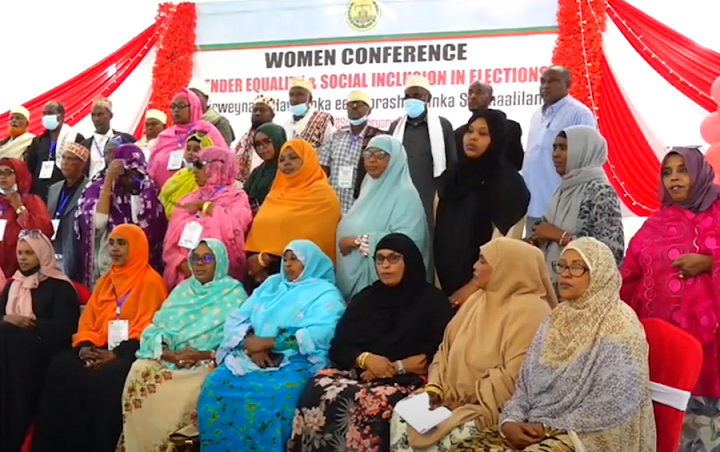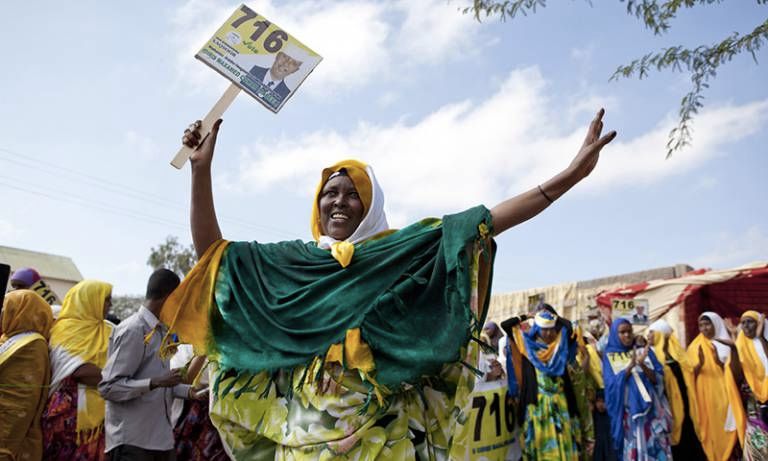
Somaliland, a self-declared state in the Horn of Africa, has long struggled with issues of gender inequality and misogyny within its political system. Despite its relative stability compared to other parts of Somalia, Somaliland continues to exclude women from meaningful participation in politics and decision-making processes.
Zero female representation
Somaliland has long been grappling with issues of gender inequality, particularly within its political system. Despite women having access to higher education and being a pillar of the economic life in this northern Somali region, women in Somaliland have faced significant barriers to political participation and representation.
These challenges were particularly evident in the 2021 parliamentary elections, which deprived women of any representation. This lack of female representation is not only a setback for gender equality and women’s rights in Somaliland, but also has serious implications for its democratic claim.
One of the main reasons for this exclusion is the clan-based political system that dominates in Somaliland. Under the local patriarchal system, political power rests on clan male elders, with women often excluded from clan decision-making processes and confined to household responsibilities. This has translated into limited opportunities for women to participate in formal politics, as they are often unable to secure clan backing and support for their candidacy.
In the lead-up to the 2021 elections, women faced significant obstacles in their attempts to run for office. According to a report by the Center for Policy Analysis (CPA), a Hargeisa-based think tank, women are heavily underrepresented and female political candidates encountered a range of challenges, including intimidation, harassment, and violence.
A Boys’ Club
Many women also faced discrimination and exclusion within their own political parties, with party leaders often favouring male candidates over their female counterparts. Suad Odowa, a well-connected businesswoman and secession campaigner, has exposed to the media how her clan chose a male over her to represent them. Other Somaliland women, such as former federal minister Fosiya Yusuf Aden, had to flee Hargeisa for Mogadishu to participate in Somali politics.
The result is that the May 2021 parliamentary and municipal elections were generally peaceful and opposition parties made significant gains, suggesting that Somaliland’s democratic system has matured. However, for critics, the political space has become a “boys’ club” reserved for the men of the overbearing Isaaq clan who dominate the political sphere unchallenged.
Despite these challenges, some women have managed to make their voices heard within Somaliland’s political system. While the towering Edna Adan Ismail, a promoter of Somaliland’s secessionist policy and of women’s health, is respected and listened to, she never questions the system. It is not the same for the younger generations who want to break the glass ceiling and feel valued by this society for which they have sacrificed so much.
There have been some efforts to increase women’s participation in politics in Somaliland. In 2017, for example, the government launched a campaign to promote women’s political participation and increase the number of women in decision-making positions. As part of this campaign, the government set a target of reserving 30% of parliamentary seats for women in the 2021 elections.

Push-back against women empowerment
However, the implementation of this goal met with significant resistance, with Parliament ultimately rejecting a female representation quota in August 2020. Some critics argue that such quotas are unnecessary and that women should be selected based on their qualifications and merit rather than their gender. Others have expressed concerns that such quotas could lead to tokenism, with women being elected to parliament simply to meet the quota rather than being given meaningful roles and responsibilities.
While these criticisms are not without merit, they overlook the underlying structural barriers that prevent women from participating in politics in the first place. The clan-based political system in Somaliland is inherently patriarchal and exclusionary, and it is difficult for women to gain political power and influence within this system without targeted interventions and affirmative action.
Moreover, the argument that women should be selected based on their qualifications and merit overlooks the fact that women are often excluded from educational and economic opportunities that would allow them to develop the skills and experience necessary to succeed in politics.
In order to level the playing field, it is important to implement targeted policies and programs that address these underlying inequalities and create opportunities for women to participate in all spheres of society. As a matter of fact, women’s rights activists should not only lobby policymakers to appoint women to important portfolios, but also educate society as a whole about the harms of gender-based discrimination and the benefits of empowering girls and women.
In conclusion
With Somaliland standing out as the only African legislature to have zero female representation, it is clear that the breakaway region in search of recognition still has a long way to go in terms of promoting gender equality and empowering women in politics.
This will require a combination of targeted policies and programs, as well as broader social and cultural changes that challenge the underlying patriarchal norms and structures that perpetuate misogyny and gender inequality.
It has been said, and rightly so, that Somaliland’s exclusionary clan-based political system clearly has deep flaws. The recent fateful events in Las Anod are an example of how far the longstanding frustrations of alienated clans’ demands for more equitable representation and participation in decision-making can go. In this polarized context, women are likely to mitigate their own grievances and fall back behind deep-rooted clan loyalties.
More women in power would have made difference in the current upheaval caused by poor decision-making. If Somaliland survived this difficult time, it is important for the government and civil society to work together to address societal issues and create a more inclusive and equitable political system for everyone in the region. It is a do-or-die situation.
